OUR TRIP TO COLOMBIA
We had a pending trip since last year to Colombia, but as we all know…2020 was full of challenges. We were very fortunate to finally visit this year and meet the coffee farmers from whom we import our specialty Colombian coffee.
As José is from Colombia, it was about time we went back to our second home and catch up with family and friends…it has been over 4 years! We decided to combine our trip to Colombia with coffee! That’s why the first two of the four weeks that we spent there were fully dedicated to visiting our producers, who we can call friends now.
We had a very smooth travelling experience from South Africa to Colombia, going via Turkey. After we landed in Bogota, where we spent a couple of days, our very 1st stop was in Pitalito, Huila. So to put you in context, this is basically the coffee-producing hot-spot of Colombia, where most of the beans that get exported are produced. It has a very small, charming airport, with direct flights to the capital. At the gate in Bogota, we met our exporter and friend Vicente Mejia, a young and well-experienced entrepreneur from Clearpath Coffee, partners of Sabores as our exclusive exporters.
It was a short and pleasant flight, and upon arrival at Pitalito’s airport, we were greeted with open arms by the coffee masters themselves: Rodrigo Sanchez and Elkin Guzman along with their beautiful families and collaborators. With them, Julio Andres Quiceno from Finca Milan, who had come all the way from Pereira (which is two “flights” away!) and who is doing an excellent job with coffee culturing.
We spent four days in Pitalito and we were able to see first hand the beautiful and healthy coffee fields of Aromas del Sur associated farms, their production, processing, and milling methods, which to be honest are of the highest quality for the Colombian standard. Our first evening was at a lovely local restaurant, along with our hosts and their families and friends. It was a feast, delicious food, great wine, and beer, we got to say a few words each and our hosts gave speeches that came directly from their hearts…we were humbled and felt like part of their team. We even received each a heart-warming souvenir box with local delicacies, a clay chive and the local aguardiente.
ELKIN GUZMAN
We spent our second day in Pitalito at Finca El Mirador visiting Elkin Guzman. His beautiful family and team welcomed us with amazing food, drinks and immediately made us feel at home.
We spent the entire day with Elkin where he took us step by step through his coffee fields, showing us and explaining clearly his innovative and world-renowned processes like Carbonic Maceration, Natural Hydro-Honey and Natural Lactic. Not only were we able to fully understand his processes, thanks to the time he took to explain them to us, but we also perceived why his coffees keep always ranking among the best of Colombia as he is truly a master!
Carbonic Macerated coffees from Elkin is available at Sabores: Caturra, Catiope and Tabi.
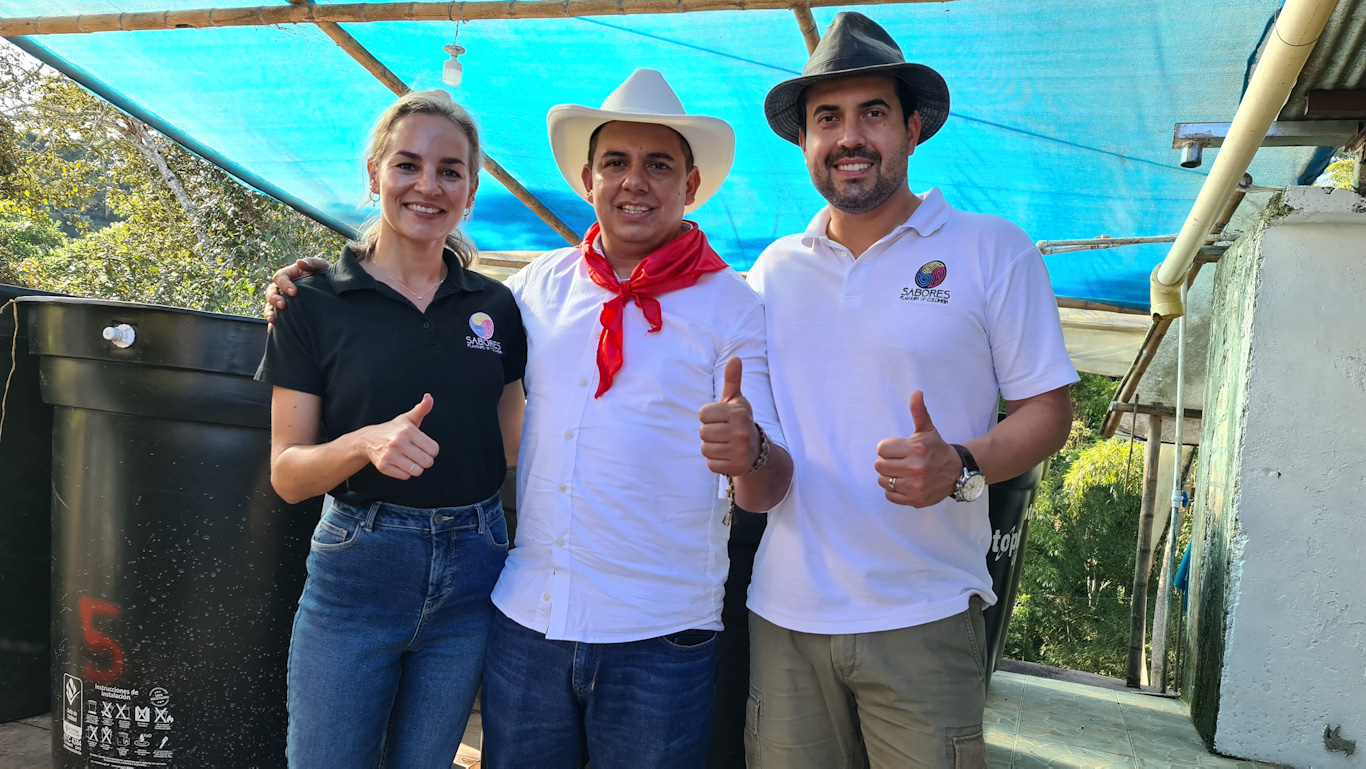
AROMAS DEL SUR
The following day we went to Aromas del Sur, the dry mill where most of our coffees get prepared and packed before leaving from Colombia to South Africa.
Rodrigo Sanchez was kind enough to show us and explain the entire process of sorting from parchment to the moment the green bean is packed. It was amazing to see the amount of sorting stages that the beans undergo before they are ready to be packed. After weight, size, colourimetric electronic sorting stages, the final quality control stage is carefully performed by the hands of hard-working ladies with their eyes thoroughly trained to remove any and all unwanted (high standards of quality) beans that might have slipped through the machines. However, nothing goes to waste, some of the by-products are used later on as fuel and the beans that are left out are sold for internal national consumption.
What a proud sensation to see some of our bags ready and packed at the dry mill itself with the farmers standing next to us.
Aromas del Sur easily ranks among the top ten quality mills of the continent. It is the perfect mix of technology and human quality control.
RODRIGO SANCHEZ
On our 3rd day in Huila, we went to visit one of Rodrigo Sanchez’s farms, Las Nubes, meaning the clouds, as you literally are above the clouds when you watch all of Pitalito from there, covered by the morning mist…it was a jaw-dropping view.
We started our day with a cupping session in the new coffee cupping lab built on the farm, La Loma, to facilitate sample roasting, crop evaluation, and sourcing at the origin, with an amazing view and over 15 coffees to try. It was all set up by his wife and also coffee producer Claudia Samboni and their daughter Natalia, who is an essential part of their national business.
Thereafter, Rodrigo took us through his interesting innovative processing techniques as well as through his drying stations. Rodrigo is one of the first Colombian farmers to have Pink Bourbon and Purple Caturra, two incredibly pleasant and versatile exotic varieties…we have an incredible blend with these two varieties available; Gold Blend. His coffee offerings are very varied and always scoring high.
In the afternoon we were taken further up the farm to his coffee plantations where we saw the sunset over the beautiful Pink Bourbon trees, full of coffee cherries…what a sight to see.
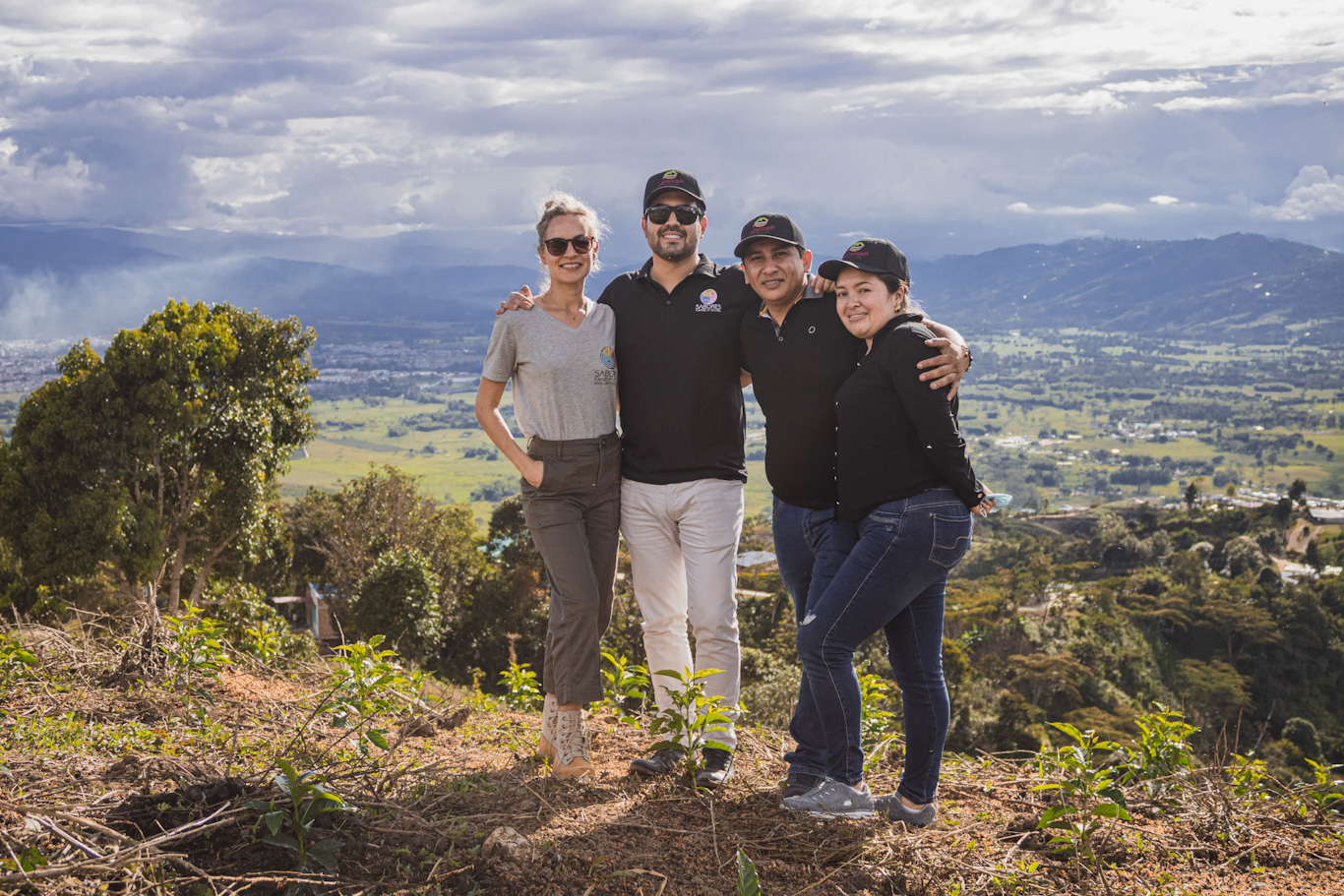
EL PUENTE
On our last day, we went to El Puente, a processing wet mill located in the municipality of Palestina, close to Pitalito. There are over one hundred local families associated with this project. This wet mill seeks to have a social impact on the families and small producers of this region who do not have more than two hectares in coffee production and who do not have the means or capacity for processing, either drying or wet processing of their coffees.
El Puente offers the possibility of buying quality coffees at a prime rate from these families. There they can be processed, and coffees of excellent quality can be produced…focussing on Natural, Honey and Washed coffees. These coffees are a blend of varieties, a mix between Caturra, Colombia and Castillo.
The process begins when the producer take the coffee to the coffee mill and the process of floating starts to eliminate all the impurities. It is then taken again to fermentation tanks, where the cherries are fermented anaerobically for 80 hours before it goes to the drying process. We met the lovely couple, Ayda Samboni and her husband, Yarley who oversee managing the mill. We were also able to walk over the little footbridge, from which El Puente got its name.
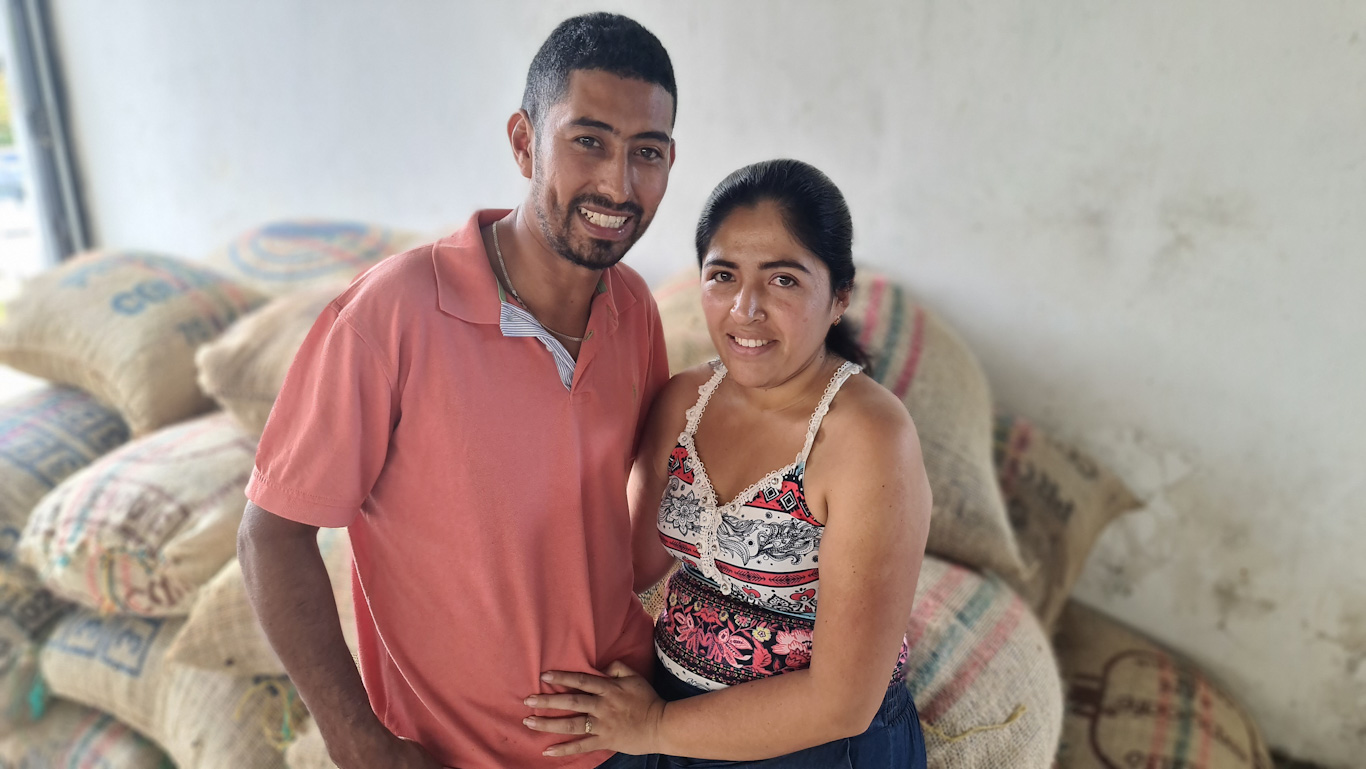
NICOLAS OCAMPO
After leaving the Huila department, we travelled to Jose’s homeplace, Valle Del Cauca where we visited Nicolas Ocampo on his beautiful farm, Finca La Julia located in the picturesque town of Trujillo.
Nicolas and his family hosted us for two days in their beautiful home which had been built by Nicolas’s father. We visited several of his coffee plantations including the exotic Java, each plantation higher than the other, and Nicolas kindly explained to us at his wet mill how he does all his coffee processes. His naturals are a must-try!
We currently have Nicolas’ Estate Blend and Tabi Blend available at Sabores…with more to come.
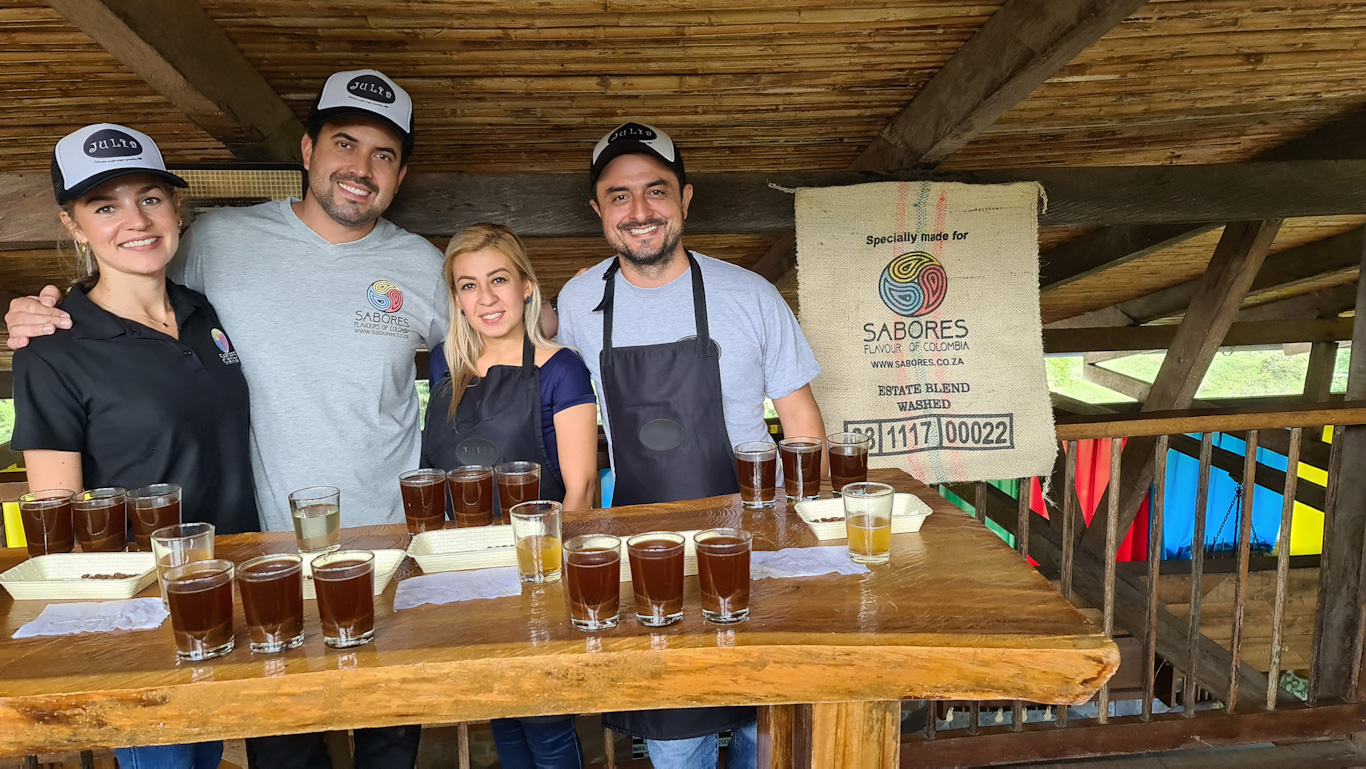
SEBASTIAN RAMIREZ
From Valle del Cauca, we travelled to Armenia, Quindio where we met Sebastian Ramirez at his stunning farm, El Placer. Sebestian and his team are working hard on unique profiles, including culturing for his Wush Wush, Gesha and Pink Bourbon.
As we arrived at the farm, we could not help but to notice the impressive drying stations, covered with Pink Bourbon busy undergoing a black honey process, and the spicy aromas were to die for. We spent the night at his plantation’s glamping tents in between the coffee trees…what a sight to wake up to and with the singing sounds of the “turpial” bird.
You can expect some of the best coffees from Sebastian at Sabores very soon!
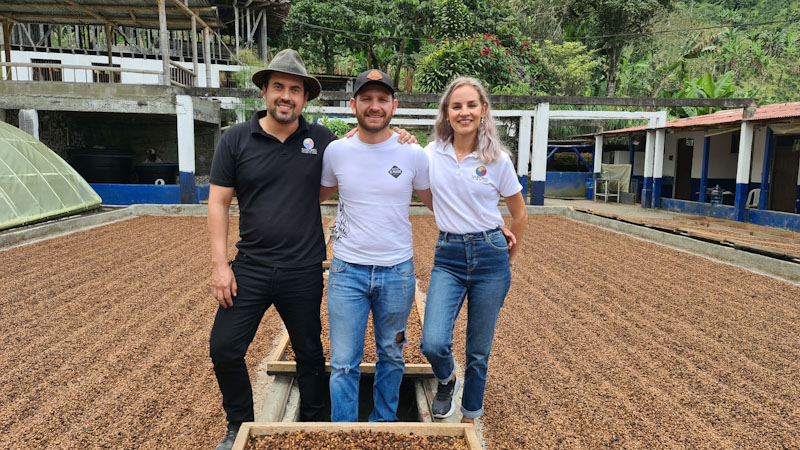
JULIO MADRID
From Quindio, we travelled north to Pereira in the Risaralda department where we spent a couple of days at Milan Estate with the coffee farmer Julio Madrid and his right hand, Andres Quiceno. They are pioneers of culturing along with Rodrigo and Sebastian. Since it is quite a new term and a very innovative process, let us briefly explain what culturing is.
It is a novel coffee fermentation technique where a starter yeast or bacterial culture (hence the name) is placed in an airtight environment with the coffee (either as full cherry or peeled) and with an energy substrate (usually locally available fruits) to develop certain desired aromas and flavour notes for that specific coffee cherry.
We went to their very impressive modern cupping lab for a mind-blowing session. Julio Andres is also a Q-grader, which made the cupping very informative and educational for us.
From the lab, we headed to the coffee farm, Finca Milan, where we were taken through the steps of coffee harvesting, wet mill processing and drying.
The next morning, we went for a walk on the farms guided by Andres. We witnessed how fully matured cherries from trees of the same variety, but just a few meters apart, can taste completely different. We were walking and eating these coffee cherries and one tree would give you watermelon, where the next would taste like passion fruit. Depending what flavours the cherries offer, Andres determines which processing method should be used to enhance the tropical characteristics of their varieties.
You can expect some great coffees from Julio Madrid at Sabores very soon.
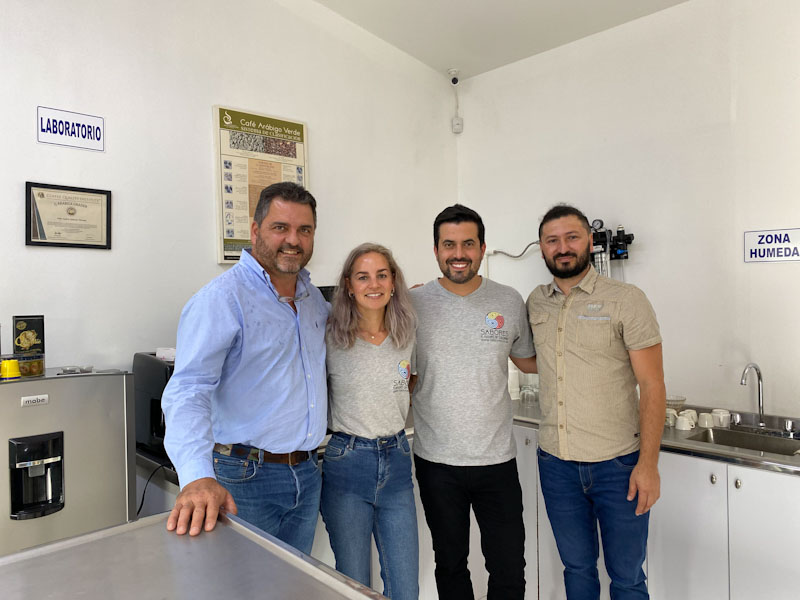
INMACULADA
Our last coffee trip was just a few kilometres outside of Cali, where Jose’s family resides. We went to visit yet another beautiful and definitely unique coffee farm called Inmaculada which stands for Immaculate. It was named after the virgin Our Lady of The Immaculate Conception, as the building where the offices, lab, and mill are, belonged to a sorority and a school several decades ago. Visually stunning, very impressive as it is still kept intact as a historical building which makes it all the more captivating.
We started our day with yet another fascinating cupping session with Johana, the Q-grader, and with Fernando Oka, the right-hand man and roaster of the farmer. All of their coffees on the cupping table were fantastic, but we were surprised by two that blew us away: Eugenioides and Sudan Rumé. These are extremely rare varieties (especially the Eugenioides), so we are extremely lucky to have been able to cup them.
We were then hosted for a lunch with great conversations with Fernando and the farmer himself, Mr Julian Holguin. His home is to die for and it is surrounded by lush gardens and of course, lots of Eugenioides trees!
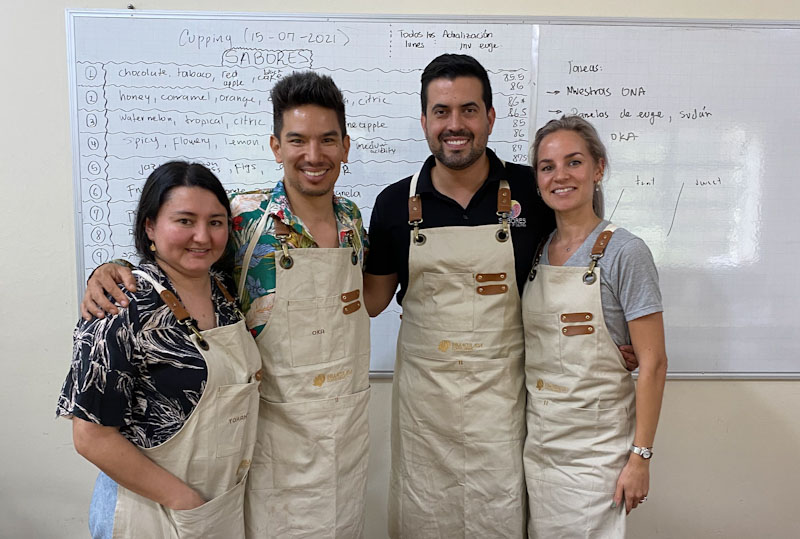
After all our coffee visits, it was time to catch up with family.
We feel extremely blessed to have met every single farmer we import from and even new farmers that we are excited to form a partnership with. Not only have we met amazing people, but we became close to them and saying goodbye wasn’t easy.
One thing that we feel the need to highlight is that all of our associated farmers are extremely honest and open people. All of them and their teams are constantly sharing their knowledge on cropping, processing, drying and milling, among themselves and with the new generations. It is vital for the sake of the specialty coffee world that farmers have open communication among themselves as these great guys do. It is something that we all can learn from, as well within our different areas of expertise.
We feel honoured to represent these amazing farmers and Colombia in South Africa and we love to share their stories! Thank you Colombia…we will be back soon. Now, South Africa, time to get ready, the best of Colombian coffees are on their way!

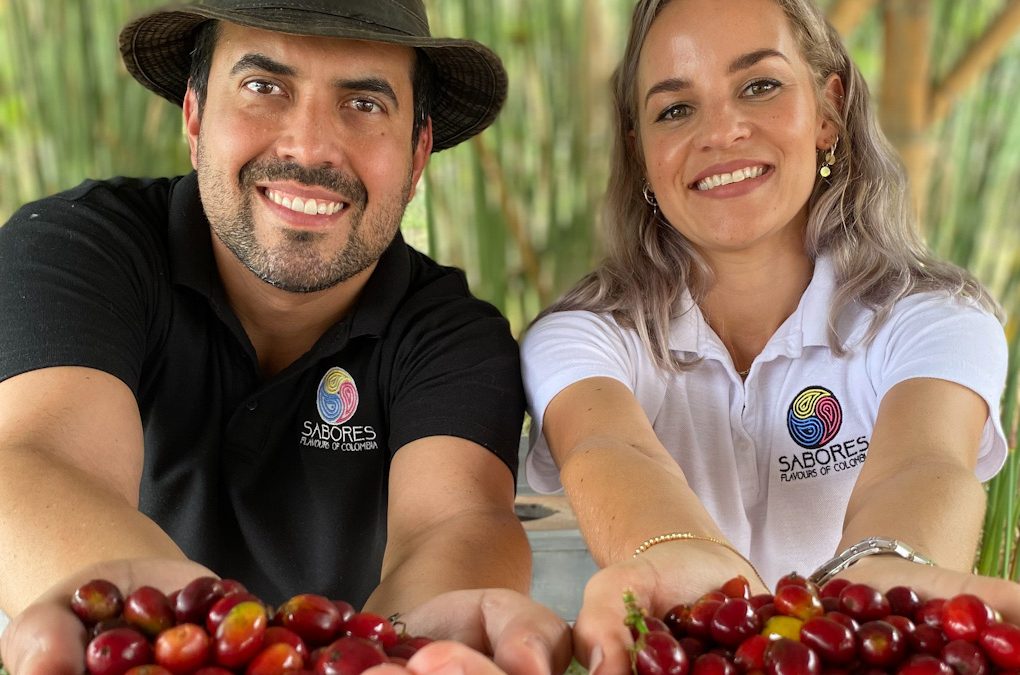
Recent Comments